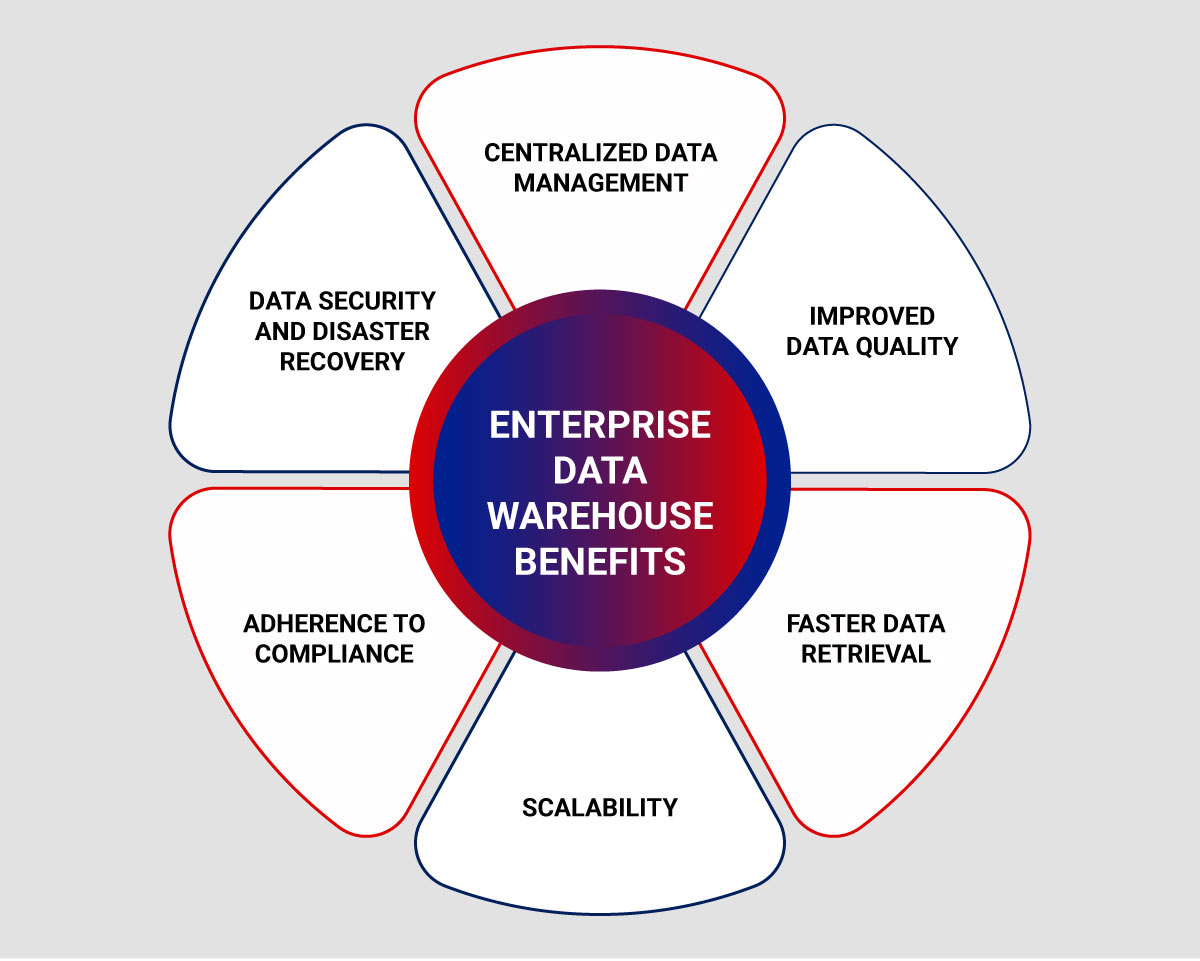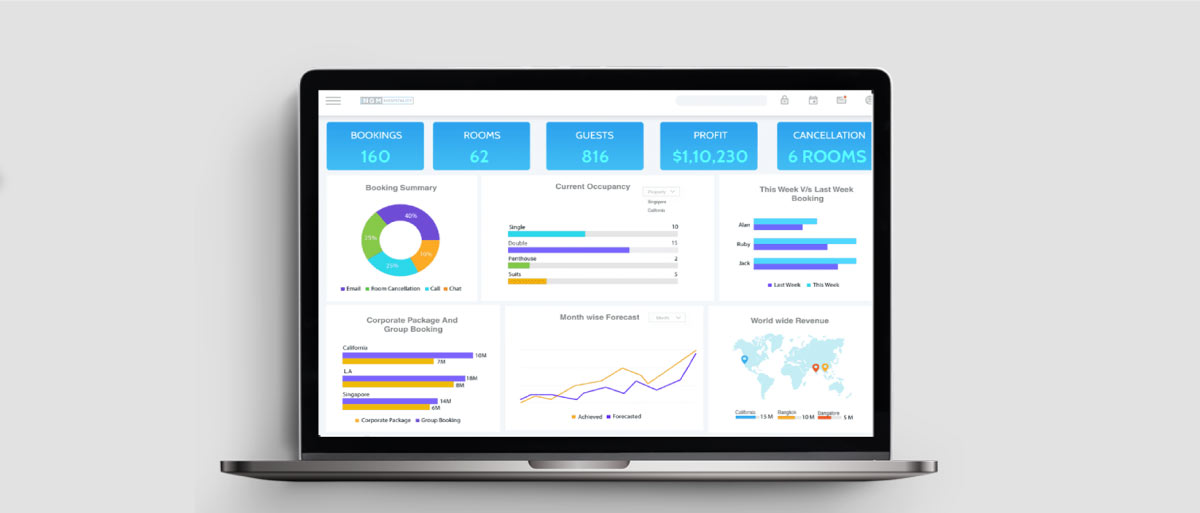In today’s data-driven business world, companies rely on vast amounts of data to make informed decisions and gain a competitive edge. However, managing and utilizing large data sets can be daunting, especially as data continues to grow exponentially. It is where an Enterprise Data Warehouse (EDW) comes in – a centralized repository that stores all relevant data from various sources, allowing businesses to access, analyze, and leverage this information to improve decision-making and drive business success. It will enable enterprises to consolidate data from various sources and make it easily accessible to employees across departments, allowing them to make better-informed decisions. With the increasing amount of data being generated by companies every day, having an EDW has become crucial for businesses to remain competitive and agile in today’s rapidly changing business landscape.
This blog will dive into EDWs and serve as a guide to help you explore what they are, why they are essential, and how they can benefit your organization.
What is an Enterprise Data Warehouse?
An enterprise data warehouse is a centralized repository of an organization’s structured and unstructured data. It would include transactional systems, customer relationship management (CRM) systems, enterprise resource planning (ERP), and other business applications. The primary purpose of an EDW is to provide a single source of truth for business intelligence and reporting. By integrating data from disparate sources into a single, consistent view, an EDW can enable organizations to make informed decisions based on accurate and timely information.
It uses extract, transform, and load (ETL) processes to extract data from source systems, transform it into a standardized format, and load it into the data warehouse. The data is then organized into dimensional models allowing fast and efficient querying and analysis. EDWs can also provide a foundation for advanced analytics, such as data mining, predictive analytics, and machine learning, by providing a comprehensive and integrated view of an organization’s data.
Difference Between Data Warehouse vs. Enterprise Data Warehouse
A standard data warehouse is designed to support an organization’s department or team. It answers section-specific questions. As opposed to that, an enterprise data warehouse is specifically designed to help the entire organization rather than just a specific department or business unit. An EDW integrates data from various sources throughout an organization, including operational systems, transactional databases, and external data sources. It entails the development of a centralized approach to accessing, organizing, and presenting information across teams and processes.
Do read this blog, if you wish to learn about data warehouse design and its importance, architecture, the steps to design a DWH and more.
Types of Enterprise Data Warehouses (EDW)
There are three main types of enterprise data warehouses.
Cloud Data Warehouse
It is a secure, scalable, and convenient service cloud vendors provide to companies that want to meet their data warehousing needs. Cloud service providers have software, hardware, and infrastructure for a flexible pay-per-use model. It is advantageous for the following reasons:
- Companies don’t need a huge upfront investment to buy and implement the entire enterprise data warehouse infrastructure.
- The cloud service provider is responsible for constantly monitoring and optimizing their hardware and software
- Businesses can scale their compute resources and storage capabilities or downsize as their requirements change and business expands
When to Use: A cloud enterprise data warehouse is a perfect choice for businesses that need the entire ecosystem set up, including data management, integration, maintenance, and support. Check out this detailed rundown on the basics of a cloud data warehouse, key features, benefits, reasons to move, major cloud data warehouse providers & how to choose the right one!
Hybrid Data Warehouse
A hybrid data warehouse allows a business to retain complete control over some components of the data warehouse while outsourcing the other parts. This option is beneficial for the following reasons:
- It gives you the flexibility to retain control of confidential business data that you don’t want to move to a cloud platform
- It enables easy adoption where businesses don’t need to move all their data to a cloud platform at once
When to Use: This broader multi-cloud adoption model is the right fit for organizations that want to leverage more than one cloud service platform to support different business apps and augment their on-premises and private cloud data centers.
On-premises Data Warehouse
This DWH is when an enterprise is solely responsible for purchasing, implementing, upgrading, and maintaining the hardware, software, and complete infrastructure. While it calls for huge capital investment, it is beneficial for businesses that want to:
- Exercise greater control over their business data and its security and privacy
- Ensure minimal latency with an on-prem ecosystem
When to use: This type of EDW suits companies that want to process their data securely while maintaining data privacy concerns. However, it is not recommended due to increased maintenance & management costs, additional hardware costs, limited-to-no flexibility, limited scalability, and an increased risk of data loss if the system crashes.
6 Benefits of Enterprise Data Warehouse

The advantages of implementing an enterprise data warehouse go way beyond analytics and BI. Here are a few major ones:
- Centralized Data Management: An EDW provides a centralized location for all organizational data. It eliminates data silos and ensures all stakeholders access accurate and consistent data.
- Improved Data Quality: An EDW enables data to be cleaned, standardized, and enriched before storage. This ensures that the data is accurate and reliable, which improves decision-making.
- Faster Data Retrieval: An EDW allows users to retrieve data quickly, even when working with large datasets. It enables faster decision-making and reduces the time required for data analysis. Your data analysts can promptly generate insights from an entire data set and create a single source of truth that saves significant time and effort.
- Scalability: An EDW can grow and evolve with an organization’s needs. It can handle large amounts of data and integrate with other systems and applications as required.
- Adherence to Compliance: An EDW enables data analysts to review quickly, vet target sources, and find errors. An EDW enables organizations to comply with data protection and privacy regulations such as GDPR, HIPAA, and PCI DSS. It ensures that data is stored securely and is only accessed by authorized personnel.
- Data Security and Disaster Recovery: Cloud data warehouses provide robust data security with auto data duplication. It creates a reliable backup that significantly minimizes the risk of data loss.
Key Features of Enterprise Data Warehouse
Our team takes a tailored approach for every client project that caters to your unique business needs. Drawing from our experience, the following features are a must-have in secure, scalable, and optimized enterprise data warehouses.
Data Integration
- Integration with ETL/ELT processes
- Complete and incremental data extraction
- Ingestion of unstructured, semi-structured, and structured data
- Ingestion of big data
- Uptake of streaming data
- Loading and querying data using SQL
Storage
- Centralized storage of subject-oriented data
- Time variable repository of business data
- Read-only repository
- Metadata storage
- Granular data storage
- Data storage in the cloud, hybrid, and on-premises environments
Database Performance
- Ease of scalability
- Automation of data backup, duplication, patching, etc.
- Advanced search capabilities
Compliance and Data Protection
- Data encryption
- User authorization and authentication
- Access controls at the row-and-column level
- Compliance with applicable state, federal, national, and niche-specific regulations (HIPAA, GDPR)
Enterprise Data Warehouse Architecture
Enterprise Data Warehouse (EDW) architecture is a framework that outlines how an organization’s data is collected, processed, and stored in a centralized repository to support business intelligence (BI) and decision-making activities.
Listed are the key elements of a typical data warehouse architecture:
- Data source layer
- Staging area
- Centralized storage layer
- Presentation Layer
This read will provide additional input on individual data warehouse solution architecture elements. Though the architecture of an EDW can vary depending on the specific needs and requirements of the organization, it generally follows a set of standard principles and best practices.
Essential Integrations For Enterprise Data Warehouse
With EDW integration, the data that enters the system gets processed, validated against existing data, and consolidated based on predefined standards. Connected apps can then use this up-to-date data, allowing employees to immediately process and update data across customer touchpoints and systems enterprise-wide.
There are several essential integrations that an enterprise data warehouse should have to be effective:
- Extract, Transform, And Load (ETL) Tools: They extract data from different sources, transform it into a standard format, and load it into the enterprise data warehouse. They are essential for integrating data from various sources and ensuring accuracy and consistency.
- Data Quality Tools: They help monitor and improve the data quality in the EDW. These tools can help identify and correct errors in the data, such as missing values or inconsistencies.
- Business Intelligence (BI) Tools: BI tools support analyzing and reporting on the data in the EDW. These tools can help users identify trends, patterns, and insights in the data that can be used to make better business decisions.
- Data Governance Tools: They are used to manage the policies, procedures, and standards for the data in the enterprise data warehouse. These tools can help ensure the data is secure, compliant with regulations, and aligned with the organization’s goals and objectives.
- Cloud Integration: They enable organizations to integrate data from different sources and provide real-time access to the data. Cloud-based enterprise data warehouses can also provide scalability and flexibility, allowing organizations to scale up or down as needed quickly.
- Metadata Management: They help manage the metadata associated with the data warehouse data. This metadata can include information such as data lineage, definitions, and relationships, which can be used to improve data governance and quality.
Overall, having these integrations in place can help ensure that an enterprise data warehouse is effective, efficient, and able to meet the organization’s needs.
Enterprise Data Warehousing Tools
The advent of cloud technology has significantly reduced the cost of data warehousing for businesses. Today, cloud data warehouse software & tools are fast, highly scalable, and available pay-per-use.
The following actions can be performed on data by utilizing the data warehouse (DWH) tools:
- Cleaning data while separating it from scrap or duplicate data
- Extraction, transformation, and loading (ETL) of the data from varied source formats onto a single standard format at the destination
- Querying data from the warehouse to fetch, update, delete, or analyze varied data combination
- Report creation for analysis and business decision-making processes
This detailed blog on data warehouse tools to use in 2023 will compare the top of the most popular cloud data platforms & their services – Microsoft Azure and Amazon AWS. It should give you a holistic understanding of their key features, benefits, and critical factors. Also, it would provide you insights for selecting the right ones to develop a high-performance enterprise data warehouse solution that delivers on your needs.
Enterprise Data Warehousing Cost Considerations
To arrive at a rough estimate of the cost of implementing an enterprise data warehouse, you need to account for the following factors:
- Resource Costs (In-house and External): You will need to consider the cost of a skilled and certified team that includes analysts, data engineers, and additional dedicated staff to model the data and optimize the warehouse for performance, availability, and scalability.
- Data Quality Costs: Data quality is critical to the success of an EDW. Poor data quality can result in incorrect analysis and decisions, which can significantly impact your business. Ensuring data quality can be expensive, requiring data profiling, cleansing, and monitoring ongoing data quality. This is the most costly component of an EDW, especially when your business is generating a massive volume of data. If you opt for cloud services, you pay per data usage and can scale your storage space as needed. It eliminates the operational expenses incurred on hardware, software, infrastructure, or site engineers. With on-premises data storage, you must spend on setting up and configuring hardware, software, and infrastructure. It includes the expenses of servers, network accessories, storage disks, and a dedicated team for support and maintenance.
- Software Costs: You must purchase and maintain the necessary software to build and manage your EDW. It includes ETL tools, data integration software, and data visualization tools. Several business intelligence platforms like Tableau, Power BI, Qlik, and Domo can be found. If you want a relatively economical option, you can choose from open-source tools like Kibana or Elasticsearch. But if you don’t wish to hire technical resources to customize and maintain your dashboards and reports, you can opt for a comprehensive BI solution where you pay per usage
- Integration Costs: Integrating your EDW with other systems can be costly, requiring custom development and testing. You must ensure that your EDW can integrate with your other systems seamlessly.
- Support and Maintenance Costs: This cost can include updating ETL flows when data sources change, optimizing the EDW to integrate new apps, modifying configurations for entities, regular testing, and ongoing support for managing and maintaining the data warehouse. Other cost components depend on the approach you use to build and deploy the EDW, whether on-premises or in the cloud & if you use the drag-and-drop interface or custom-code ETL pipelines.
Other significant factors that can impact the cost of implementing an enterprise data warehouse solution are the number and variety of data sources, the volume of data to be ingested, the complexity of flows, and the data sensitivity and security requirements.
Why Rishabh Software for EDW Services?
Our data warehouse consulting services help companies of all sizes to navigate their DWH journeys, whether for implementing a scalable data warehouse or upgrading the existing one. Our services cover all four phases: strategy, design and development, and ongoing support. You can count on us to build comprehensive DWH solutions, including EDW, Operational Data Store (ODS), and data marts. And we have hands-on experience with managing DWH components, including central database, ETL (Extract, Transform, Load) tools, and access tools.
Our approach covers the following:
- Need assessment
- Implementation strategy creation
- EDW configuration and development
- Data management
- EDW support and maintenance
And as your business grows, we also help you level up your enterprise data warehouse with advanced ETL tools and data pipelines and align it in every aspect.
Success Story
Case Study: Development of a Cloud-based Enterprise Data Warehouse

A US-based F&B & Resort management company wanted to eliminate data silos and efficiently manage disparate data from 20+ sources. It was an outcome of multiple acquisitions with varied data source integration. They tried to unify their business data and merge numerous business applications, including PMS, POS, analytics, inventory, etc. So, data collaboration for analytics & reporting from various apps and sources was manual, time-consuming, and expensive.
They turned to Rishabh Software to create a data warehouse that would act as a centralized source of truth. We helped them build a cloud EDW solution after consolidating data from all the internal and third-party apps. Our team used Power BI and Microsoft SQL Server Analysis Services to map their key metrics, including demand forecasting, cost management, and client satisfaction.
Key Benefits Delivered:
- 2X increase in operational efficiency
- 99% increase in business understanding available on-the-go
- 40% drop in data quality problems
Read more about the cloud-based data warehouse system and how it helped the client overcome its key features, the technologies used, and how it helped unify data and optimize decision-making.
Wrapping it Up!
In conclusion, an enterprise data warehouse (EDW) is a crucial tool for businesses looking to harness the power of their data. By integrating data from multiple sources and providing a centralized analytical repository, an EDW can help organizations make informed decisions, identify new opportunities, and gain a competitive advantage. Without an EDW solution to collate, standardize and distribute your data, you’re leaving your business vulnerable to factual inaccuracies, erroneous reporting, and poor decision-making – all of which can derail its growth and development.
Implementing an EDW requires careful planning and execution, but the benefits can be significant. With the right approach, an EDW can provide a foundation for a data-driven culture where decision-making is based on facts rather than intuition. With enhanced scalability, data consistency, and greater efficiency, an EDW is a wise investment that allows you to manage your data on the go and always have analysis-ready data.
As data grows, an enterprise data warehouse will likely become essential to any modern business. By investing in an EDW now, organizations can position themselves for success in the future.








